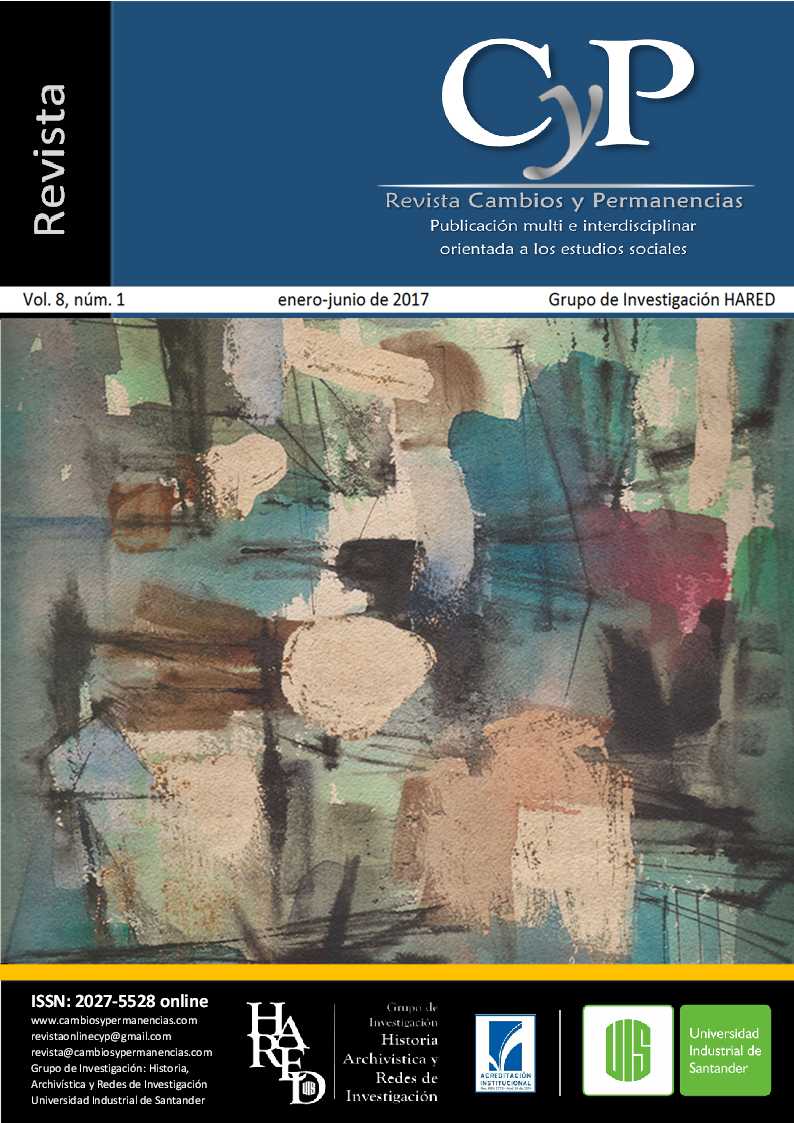Artículos
‘País Cerrado. Teatro Abierto’: Between cinema and theater in the transition to Democracy in Argentina
Published 2017-06-05
Keywords
- Transition,
- theater,
- cinema documentary,
- dictatorship,
- democracy
How to Cite
Manduca, R. (2017). ‘País Cerrado. Teatro Abierto’: Between cinema and theater in the transition to Democracy in Argentina. Cambios Y Permanencias, 8(1), 347–366. Retrieved from https://revistas.uis.edu.co/index.php/revistacyp/article/view/6964
Abstract
This work seeks to account for the links of the theater artists who were part of the Teatro Abierto movement with other sectors of the Argentine cultural field, specifically with the Documentary Cinema. The film "País Cerrado. Teatro Abierto" (1990) by Arturo Balassa proposes a specific reading of the cycle and the political stage in which it takes place. The analysis of the discourse articulated therein will be the central object of the research, hand in hand with understanding the production of the same in a particular socio-historical context, marked by the transition to democracy.
Downloads
Download data is not yet available.
References
Campo, J. (2012). Cine documenral argentino. Entre el arte, la cultura y la política. Buenos Aires. Imago Mundi.
Casale, M. (2011). "El cine en la postdictadura: los documentales histórico-políticos durante el primer gobierno democrático". En A. L. Lusnich y P. Piedras (eds.), Una historia del cine político y social en Argentina (1969-2009) (pp. 356-385). Buenos Aires: Nueva Librería.
Longoni, A. (2013). Iniciar el debate, a una red de colaboraciones, a otro modo de hacer. Afuera. Estudios de Crítica Cultural, 3(13).
Manduca, R. (2016). Teatro Abierto (1981-1983): un actor social de la transición a la democracia. Revista de Historia de la Universidad Nacional del Comahue, (17), 247-272.
Margulis, P. (2014). De la formación a la institución. El documental audiovisual argentino en la transición democrática (1982-1990). Buenos Aires: Imago Mundi.
Pelletieri, O. (2001). La Segunda fase de la Segunda Modernidad Teatral Argentina (1976-1983). En O. Pelletieri (Coord). Historia del Teatro Argentino en Buenos Aires. El Teatro Actual (1976-1998) (pp. 73-79). Buenos Aires: Ediciones Galerna.
Verzero, L. (2013). Teatro militante: Radicalización artística y política en los años 70. Buenos Aires: Biblos.
Verzero, L. (2014). Entre la clandestinidad y la Ostentación: Estrategias del activismo teatral bajo dictadura en Argentina. En G. Remedi (Coord). El teatro fuera de los teatros. Reflexiones críticas desde el Archipiélago Teatral (pp. 87-105). Montevideo: CSIC.
Villagra, I. (2013). Teatro Abierto 1981: Dictadura y resistencia cultural. Estudio Crítico de Fuentes Primarias y Secundarias. La Plata: Al margen.
Villagra, I. (2015). Estudio Crítico de fuentes. Historización Teatro Abierto ciclos 1982-1983. Buenos Aires: El Zócalo ediciones.
Villagra, I. (2016). El devenir de Teatro Abierto. Estudio Crítico de fuentes. Historización 1984, 1985 y 1986. Buenos Aires: El Zócalo.
Filmografía
Vanoli, E. (productor) y Pérez, M. (director). (1983). La República Perdida [cinta cinematográfica. Argentina, Noran SRL.
Balassa, A. (director). (1972). El río [cortometraje]. Argentina
Balassa, A. (director). (1976). Esencias [cortometraje]. Argentina
Balassa, A. (director). (1990). País cerrado. Teatro Abierto [cinta cinematográfica]. Argentina, AB Cine Video Producciones.
Álvarez, M. (productor) y Mignogna, E. (Director). (1984). Evita, quien quiera oír que oiga [cinta cinematográfica]. Argentina.
Abad, J. (productor) y Brunati, L. (director). (1989). D.N.I (La otra historia) [cinta cinematográfica]. Argentina.
Tafur, J. L. (productor) y Garci, J. L. (director). (1977). Asignatura pendiente [cinta cinematográfica]. España. José Luis Tafur P.C.
Entrevistas
Balassa, A. (21 de septiembre de 2016) entrevistado por R. Manduca, Buenos Aires.
Balassa, A. (27 de febrero de 2017) entrevistado por R. Manduca, Buenos Aires.
Casale, M. (2011). "El cine en la postdictadura: los documentales histórico-políticos durante el primer gobierno democrático". En A. L. Lusnich y P. Piedras (eds.), Una historia del cine político y social en Argentina (1969-2009) (pp. 356-385). Buenos Aires: Nueva Librería.
Longoni, A. (2013). Iniciar el debate, a una red de colaboraciones, a otro modo de hacer. Afuera. Estudios de Crítica Cultural, 3(13).
Manduca, R. (2016). Teatro Abierto (1981-1983): un actor social de la transición a la democracia. Revista de Historia de la Universidad Nacional del Comahue, (17), 247-272.
Margulis, P. (2014). De la formación a la institución. El documental audiovisual argentino en la transición democrática (1982-1990). Buenos Aires: Imago Mundi.
Pelletieri, O. (2001). La Segunda fase de la Segunda Modernidad Teatral Argentina (1976-1983). En O. Pelletieri (Coord). Historia del Teatro Argentino en Buenos Aires. El Teatro Actual (1976-1998) (pp. 73-79). Buenos Aires: Ediciones Galerna.
Verzero, L. (2013). Teatro militante: Radicalización artística y política en los años 70. Buenos Aires: Biblos.
Verzero, L. (2014). Entre la clandestinidad y la Ostentación: Estrategias del activismo teatral bajo dictadura en Argentina. En G. Remedi (Coord). El teatro fuera de los teatros. Reflexiones críticas desde el Archipiélago Teatral (pp. 87-105). Montevideo: CSIC.
Villagra, I. (2013). Teatro Abierto 1981: Dictadura y resistencia cultural. Estudio Crítico de Fuentes Primarias y Secundarias. La Plata: Al margen.
Villagra, I. (2015). Estudio Crítico de fuentes. Historización Teatro Abierto ciclos 1982-1983. Buenos Aires: El Zócalo ediciones.
Villagra, I. (2016). El devenir de Teatro Abierto. Estudio Crítico de fuentes. Historización 1984, 1985 y 1986. Buenos Aires: El Zócalo.
Filmografía
Vanoli, E. (productor) y Pérez, M. (director). (1983). La República Perdida [cinta cinematográfica. Argentina, Noran SRL.
Balassa, A. (director). (1972). El río [cortometraje]. Argentina
Balassa, A. (director). (1976). Esencias [cortometraje]. Argentina
Balassa, A. (director). (1990). País cerrado. Teatro Abierto [cinta cinematográfica]. Argentina, AB Cine Video Producciones.
Álvarez, M. (productor) y Mignogna, E. (Director). (1984). Evita, quien quiera oír que oiga [cinta cinematográfica]. Argentina.
Abad, J. (productor) y Brunati, L. (director). (1989). D.N.I (La otra historia) [cinta cinematográfica]. Argentina.
Tafur, J. L. (productor) y Garci, J. L. (director). (1977). Asignatura pendiente [cinta cinematográfica]. España. José Luis Tafur P.C.
Entrevistas
Balassa, A. (21 de septiembre de 2016) entrevistado por R. Manduca, Buenos Aires.
Balassa, A. (27 de febrero de 2017) entrevistado por R. Manduca, Buenos Aires.


